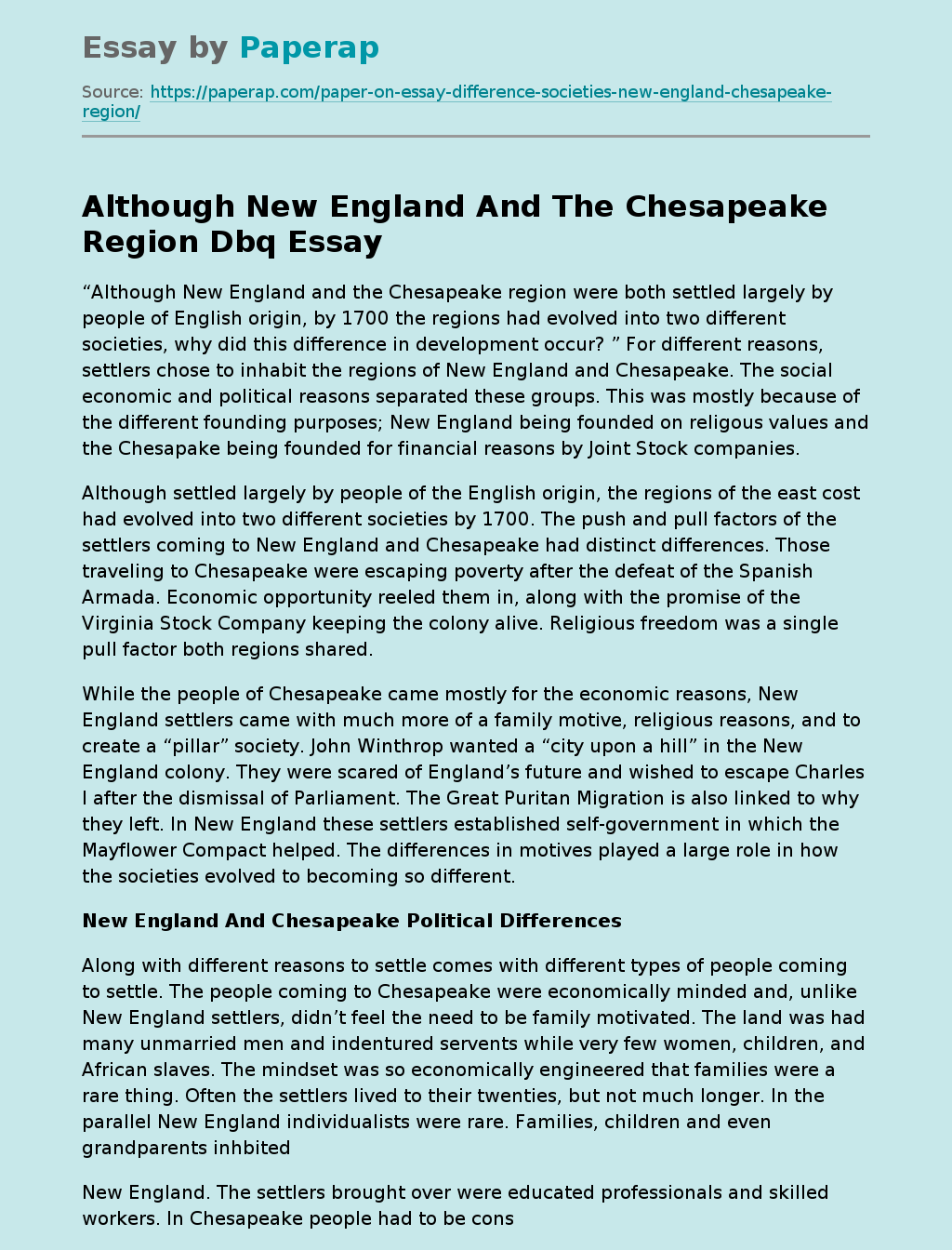Although New England And The Chesapeake Region Dbq
“Although New England and the Chesapeake region were both settled largely by people of English origin, by 1700 the regions had evolved into two different societies, why did this difference in development occur? ” For different reasons, settlers chose to inhabit the regions of New England and Chesapeake. The social economic and political reasons separated these groups. This was mostly because of the different founding purposes; New England being founded on religous values and the Chesapake being founded for financial reasons by Joint Stock companies.
Although settled largely by people of the English origin, the regions of the east cost had evolved into two different societies by 1700. The push and pull factors of the settlers coming to New England and Chesapeake had distinct differences. Those traveling to Chesapeake were escaping poverty after the defeat of the Spanish Armada. Economic opportunity reeled them in, along with the promise of the Virginia Stock Company keeping the colony alive. Religious freedom was a single pull factor both regions shared.
While the people of Chesapeake came mostly for the economic reasons, New England settlers came with much more of a family motive, religious reasons, and to create a “pillar” society. John Winthrop wanted a “city upon a hill” in the New England colony. They were scared of England’s future and wished to escape Charles I after the dismissal of Parliament. The Great Puritan Migration is also linked to why they left. In New England these settlers established self-government in which the Mayflower Compact helped. The differences in motives played a large role in how the societies evolved to becoming so different.
New England And Chesapeake Political Differences
Along with different reasons to settle comes with different types of people coming to settle. The people coming to Chesapeake were economically minded and, unlike New England settlers, didn’t feel the need to be family motivated. The land was had many unmarried men and indentured servents while very few women, children, and African slaves. The mindset was so economically engineered that families were a rare thing. Often the settlers lived to their twenties, but not much longer. In the parallel New England individualists were rare. Families, children and even grandparents inhbited
New England. The settlers brought over were educated professionals and skilled workers. In Chesapeake people had to be constantly sent over to keep the population up and the colony successful but in New England educated traits were passed down in families so their population grew successfully. New England’s population was not very diverse though, and also did not have many slaves. Combining the different reasons the settlers came to Chesapeake and New England and the types of people they were results to the societies that were constructed in these colonies.
Chesapeake was agriculturally driven while New England on the contrary had commerce and was much more business-like. Chesapeake also had a few varieties in the levels of society. Small farmers held most of the population, then there are the landless whites, great farmers, indentured servents and slaves. Because of the little amount of women until the 17th century, Chesapeake had very weak family ties. One in three brides were already pregnant! In New England marriage was an extremely important key to their society. Their orderly society was based on religion, but was not very tolerant.
The Congregational Church could be found here along witht the General Court. Agriculture was not used much at all in this colony. Ship building, labor, and fishing were the key elements to their economic success. Although both were settled by the same origin on English people, there are many contrasts in the societies of the colonies Chesapeake and New England. These contrasts are made by putting the differences together and comparing who came to these colonies, why they came, and what had become of the colonies. The varieties in motivation and the types of settlers and societies were what made these colonies so dynamically different.
Although New England And The Chesapeake Region Dbq. (2019, Dec 05). Retrieved from https://paperap.com/paper-on-essay-difference-societies-new-england-chesapeake-region/

